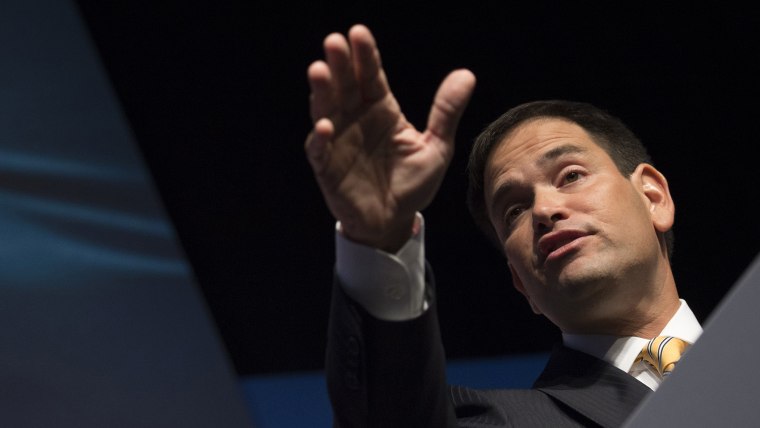During a campaign swing in New Hampshire last week, Wisconsin Gov. Scott Walker (R) was asked for his take on some of his likely rivals for the GOP presidential nomination. When Sen. Marco Rubio's (R-Fla.) name came up, Walker said the senator is "great at foreign policy."
There's quite a bit of evidence to the contrary.
In remarks last week, Rubio reflected on the Green Revolution and developments in Iran in 2009. The senator argued, "You know what the White House said? 'We're not going to comment on that election because we're not going to interfere in the sovereignty of Iran.' So they will comment on the elections of an ally, calling the rhetoric of the [Israeli] election divisive, but when Iran has a fraudulent election and kills people that protest against it, we can't comment."
It'd be a decent argument if this were in any way rooted in fact, but as Glenn Kessler explained, Rubio's claims are largely the opposite of reality.
Rubio appears to have created a cartoon version of the White House reaction to the Green Revolution. While the administration did cite a need to respect Iran's sovereignty, the president did more than simply decline to comment. He deplored the violence and eventually condemned the regime. Rubio would have every right to offer his opinion that the president was too slow or halting in his response, or did too little too late. But his claim that the president offered no comment at all is simply factually wrong.
I'd add, by the way, that during the Green Revolution, Iranian protestors didn't want -- and didn't ask for -- endorsements from the U.S. administration. On the contrary, they wanted the White House to stay out of it altogether, fearing American support would make it easier for Iranian officials to characterize protestors as puppets of the U.S. government.
It's become a staple of Republican rhetoric -- Obama "refused" to side with Iranian demonstrations when the Green Revolution needed American support -- but it's an overly simplistic mistake reflecting GOP confusion about the nuances of foreign policy.
When Rubio's office was pressed for an explanation, the senator's aide referred the Washington Post to this New York Times article, which quoted then-Sen. Dick Lugar (R-Ind.), the top Republican on the Senate Foreign Relations Committee, defending Obama's approach.
Maybe Team Rubio intended to point to a different piece?
The larger point, of course, is that Rubio continues to talk about foreign policy, positioning himself as an expert on international affairs in advance of his likely presidential campaign. But the more he addresses the issue, the more mistakes he makes.
Rubio's recent confrontation with Secretary of State John Kerry did not go well. His recent argument about Obama and Israel was quickly discredited as nonsense. His comments about abandoning U.S. allies on nuclear diplomacy were rather bizarre.
As we talked about last week, it's tempting to think it's early in the campaign process and there's still time for Rubio to get up to speed on matters of international affairs. But therein lies the point -- as far as Rubio is concerned, foreign policy is his area of expertise.
Maybe, before the cycle moves forward, the Florida Republican can pick a different signature issue?
